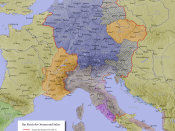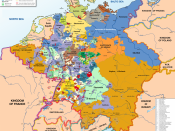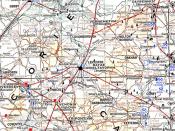History has shown us how civilizations evolve over time. Broadly interpreted, the age of Diocletian marked a decisive stage in the transition from the classical, the Greco-Roman, civilization of the ancient Roman Empire to the Christian-Germanic civilization of the early Middle Ages. Similarly interpreted, "the age of the Renaissance
marked the transition from the civilization of the Middle Ages to the modern world"(Ferguson 1). Therefore, the Renaissance is the beginning of the modern world and modern government.
In law the tendency was to challenge the abstract dialectical method of the medieval jurists with a philological and historical interpretation of the sources of Roman Law. As for political thought, the medieval proposition that the preservation of liberty, law, and
justice constitutes the central aim of political life was challenged but not overthrown by Renaissance theorists. They contended that the central task of government was to maintain security and peace. Machiavelli maintained that the creative force (virtj) of the ruler was the key to the preservation of both his own position and the well-being of his subjects, an idea consonant with contemporary
politics.
Italian city-states were transformed during the Renaissance from communes to territorial states, each of which sought to expand at the expense of the others. Territorial unification also took place in Spain, France, and England. The process was aided by modern diplomacy,
which took its place beside the new warfare when the Italian city-states established resident embassies at foreign courts. By the 16th century, the institution of permanent embassies spread northward of France, England, and the Holy Roman Empire.
Renaissance churchmen, particularly in the higher echelons, patterned their behavior after the mores and ethics of lay society. The activities of popes, cardinals, and bishops were scarcely distinguishable from those of secular merchants and political figures. At the same time,


